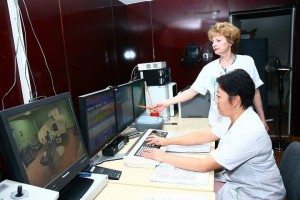 ASTANA – Journalists were shown a day in the life of oncology and tuberculosis specialists in Kazakhstan on a press tour organised by the Kazakhstan Scientific Research Institute (KazSRI) of Oncology and Radiology and the National Centre for Tuberculosis Problems (NCTP) on June 13, just before the National Day of Medical Workers. Advanced innovative technologies for the rapid diagnosis of the two socially significant diseases as well as complex surgical processes were also demonstrated.
ASTANA – Journalists were shown a day in the life of oncology and tuberculosis specialists in Kazakhstan on a press tour organised by the Kazakhstan Scientific Research Institute (KazSRI) of Oncology and Radiology and the National Centre for Tuberculosis Problems (NCTP) on June 13, just before the National Day of Medical Workers. Advanced innovative technologies for the rapid diagnosis of the two socially significant diseases as well as complex surgical processes were also demonstrated.
Kazakh experts identify early-stage cancer and TB much more frequently now, and over the past 10 years the death rate from TB in Kazakhstan has decreased by 72.8 percent. The Ministry of Healthcare has implemented six screening programmes for early detection of the most common types of cancer, which has led to more positive outcomes. Through this early diagnosis, doctors have managed to achieve positive results in the implementation of the state Cancer Care Development Programme for 2012-2016 and the National TB Control programme.
The oncology and radiology offices of KazSRI and the NCTP were opened for the media day, including surgical departments where reporters could see the tuberculosis mycobacterium and modern methods of TB diagnosis at the National Bacteriological Reference Laboratory.
The introduction of advanced innovative technologies for accelerated laboratory diagnosis is an important factor in improving cancer and tuberculosis treatment. KazSRI is now fitted out with high-tech equipment. American high-energy linear accelerators of the latest generation cost up to 1.5 billion tenge (US$8.1 million). Using what they term a “gamma knife” and “cyber knife,” their beams affect only tumours, while healthy tissue is not irradiated.
“Low-energy linear accelerators, co-produced by Japan and Germany, will be delivered before the end of this year to five high-tech radiation oncology centres of Kazakhstan,” said Director of KazSRI Kuanysh Nurgaziyev.
All regional and city bacteriological laboratories in TB dispensaries have introduced advanced innovative technologies for rapid laboratory diagnosis of tuberculosis, including the BACTES MGIT-960, Hain-test and Gene-Expert tests.
For 2012-2016, the state has allocated 211 billion tenge (US$1.1 billion) for the development of oncological care, and the funding of TB services is increasing each year. In 2013, it was 35,472.2 million tenge (US$193.3 million), while in 2012 it was 34,569.4 million tenge (US$188.3 million). Kazakhstan is one of the few countries in the world where all cancer and anti-TB drugs are paid for by the state budget.
According NCTP Director Tleukhan Abildayev, along with the adjusted conservative treatment, new surgical technologies for TB patients and patients with extensively drug-resistant tuberculosis are being introduced.
Nurgaziyev and Abildayev noted that despite the positive steps, they are not going to slow down and they will do everything possible to achieve even better results in the near future in the fight against socially significant diseases.


